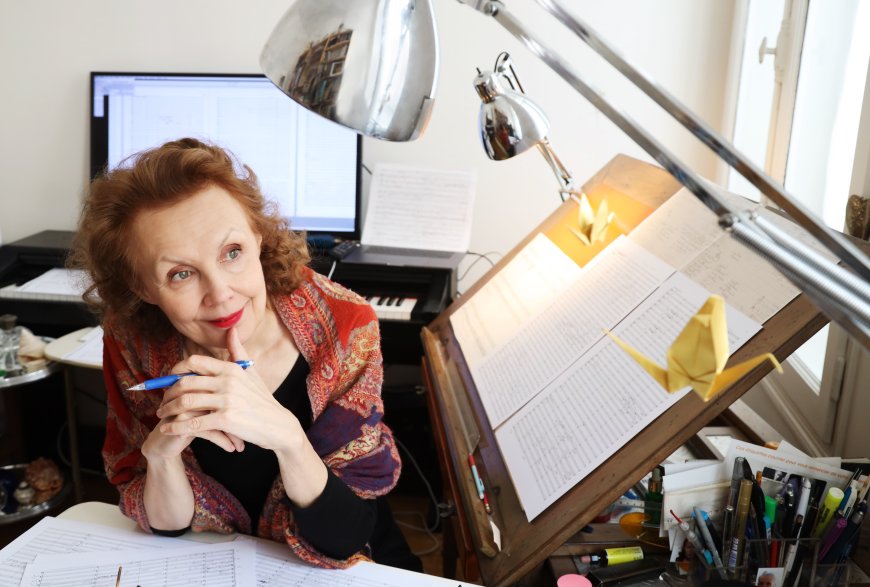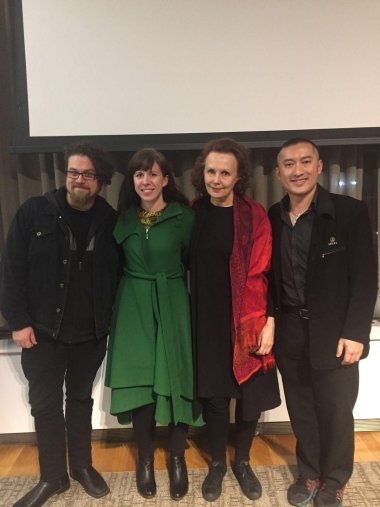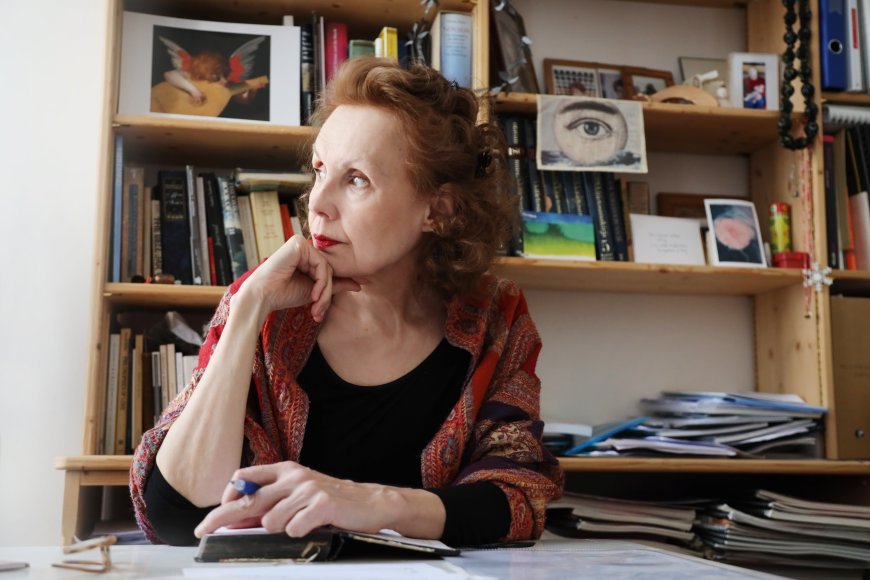
This fall, Mannes Opera — the opera program of The New School’s Mannes School of Music — opens its 2025–2026 season with a production connecting two visionaries whose ideas continue to resonate: radical French philosopher Simone Weil and pathbreaking Finnish composer Kaija Saariaho.
Inaugurating a lineup centering female composers, directors, and conductors, Mannes will present a fully staged chamber version of Saariaho’s La Passion de Simone, the opera-oratorio that explores Weil’s life and writings with libretto by Amin Maalouf, on October 10 and 11 at Baruch Performing Arts Center. The production is directed by Emma Griffin, managing artistic director of Mannes Opera, with Micah Gleason conducting. Admission is free.
While celebrated worldwide, Saariaho, who passed away in 2023, had a special presence for Bay Area audiences. Among other connections, San Francisco Opera co-commissioned and presented the U.S. premiere of her final opera, Innocence, in 2024, and the San Francisco Symphony’s 2023 performance of her Adriana Mater, recorded for Deutsche Grammophon mere days after her death, went on to win a Grammy. She was a close friend and frequent collaborator of fellow Finnish musician, conductor Esa-Pekka Salonen.
Saariaho’s choice of subject reflects her lifelong admiration for and relationship with Weil’s writings; she even considered the Passion to be her most important stage work. And the philosopher herself had many layers to unravel that continue evoking questions today. “It feels so hard to talk about Simone Weil, because which Simone Weil are you talking about?” says Griffin. “The woman, the politician, the revolutionary?” Many, including Saariaho’s close collaborator and the work’s initial director, Peter Sellars, focus on her social and political activism; the composer, however, was “always fascinated by Simone’s striving for abstract (mathematical) and spiritual-intellectual goals.”

The Passion channels Weil’s mystic side, beginning with its structure. The suspenseful, haunting music is organized into 15 “stations,” a reference to the Catholic Stations of the Cross, which depict scenes from Christ’s Passion. For the staging, Griffin is considering the Catholic tradition of walking meditation between stations in churches, labyrinths, or gardens.
The work’s sense of mysticism also resonates with the current moment: Griffin points to “the idea of listening to silence and being able to be present,” in a culture grappling with what this means vis-à-vis technology.
“The way that Weil is talking about attention as a spiritual activity, and also sort of an essential human right, feels important,” she said.
The Passion is a monodrama, though not sung by Simone herself. “It’s unclear if Simone’s onstage,” says Griffin. Instead, a solo soprano narrator — something like a sister — narrates. For this production, and with the blessing of Saariaho’s estate, the role is divided among three singers: Brooke Jones, Daniella Brancato, and Ruijia Dong, to give more students performing opportunities. They are joined by a vocal quartet and a voice delivering Weil’s texts — here spoken live by actor Clara Camacho — in an ongoing dialogue about Weil and her relentless search for truth.
The libretto traces the elusive thinker’s many contradictions. Saariaho wrote that Maalouf —another frequent collaborator — “brought out the gaping discrepancy between her philosophy and her life, showing the fate of the frail human being among great ideas.” This includes Weil’s Jewish heritage and attraction to Catholicism, but rejection of baptism; her pacifism juxtaposed with fighting in the Spanish Civil War; her devotion to intellectual life paired with grueling manual labor; and her passion for humanity, even as her own willful starvation — insisting she eat no more than the rations of French fighters held in Germany — led to her death in 1943 at age 34.
The work not only contemplates these paradoxes but also expresses vexation with them. Griffin points to Station No. 11:
Finally, you resigned yourself to go to war,
A little later than others,
But then, you wanted to go to the very end.
There loomed from you
Such a thirst for sacrifice!
“There’s an articulate rage at the idea of Weil and her sacrifice. There’s a sense of loss, a sense of, we need you, and you're not here,” she said.
Beyond the stage, this production of the Passion continues Mannes’s deep relationship with the late composer. Saariaho’s first connection with the school was not as an artist, but as an engaged parent: her daughter, Aliisa Neige Barrière, studied violin at Mannes Prep and later enrolled in the college. As Saariaho and her husband, composer Jean-Baptiste Barrière, became acquainted with the school’s leadership, they went on to serve in alternating composer residencies.

In 2018, Saariaho served as composer-in-residence, mentoring students, leading masterclasses, and supporting Mannes’s first chamber staging of La Passion de Simone, with students performing alongside members of the International Contemporary Ensemble and in partnership with Théâtre du Châtelet. The collaboration extended to her family: her son, Aleksi Barrière, directed, while her husband contributed a video installation. By all accounts, Saariaho’s multifaceted presence created a memorable and enriching experience for students.
It also helped expand prevailing conceptions of what a ‘composer’ looks like, beyond the solitary male genius. As Richard Kessler, the recently appointed provost of The New School, and former long-serving dean of Mannes, says, “Kaija was a citizen before she was a composer…thoughtful, kind, brilliant. She's not an icon, she's a human being.”
At the time Saariaho’s career was developing, Kessler notes, “it was so difficult for women composers. All the funding panels, the faculties at conservatories — up until even pretty recently, you'd be hard-pressed to find a woman.” In 2016, Saariaho’s L’Amour de Loin became the first opera by a woman to be staged at the Metropolitan Opera in over a century.
The performance of Saariaho’s Passion is part of a rigorous, wide-ranging, women-centered season that also embodies the school’s larger ethos: growth through exposure and experimentation.
“Our students may have an early idea of, here's the repertoire I love, the career I'm going to have,” said William Gustafson, the recently appointed dean of Mannes. “That's great, to have that direction and focus.” But in the right environment, “doors and minds get opened, and opportunities present themselves. You may find yourself in situations that you may never have predicted. That can be transformative.”
True to that spirit, Griffin notes that the Passion was most students’ first encounter with Saariaho. “It’s so challenging, so hard, but they're loving it. It's so rewarding.”




